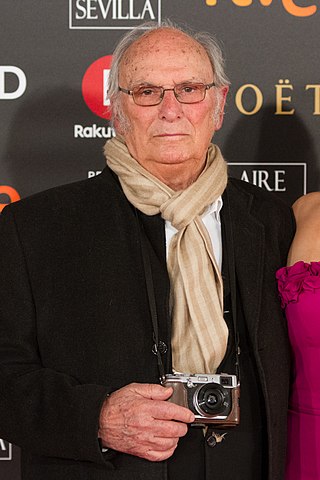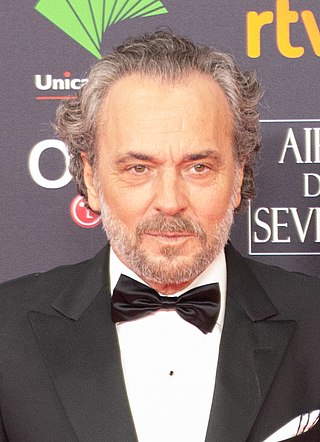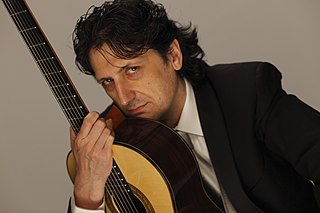
Francisco Rabal Valera, better known as Paco Rabal, was a Spanish actor, director, and screenwriter born in Águilas, a town in the south-western part of the province of Murcia, Spain. Throughout his career, Rabal appeared in around 200 films working with directors including Francesc Rovira-Beleta, Luis Buñuel, José Luis Sáenz de Heredia, Carlos Saura, Pedro Almodóvar, William Friedkin, Michelangelo Antonioni, Claude Chabrol, Luchino Visconti, and Gillo Pontecorvo. Paco Rabal was recognized both in his native Spain and internationally, winning the Award for Best Actor at the Cannes Film Festival for Los Santos Inocentes and a Goya Award for Best Actor for playing Francisco de Goya in Carlos Saura's Goya en Burdeos. One of Spain's most loved actors, Rabal also was known for his commitment to human rights and other social causes.

Carlos Saura Atarés was a Spanish film director, photographer and writer. With Luis Buñuel and Pedro Almodóvar, he is considered to be among Spain's great filmmakers. He had a long and prolific career that spanned over half a century, and his films won many international awards.

The Goya Award for Best Supporting Actor is an award presented annually by the Academy of Cinematographic Arts and Sciences of Spain. It is given in honor of an actor who has delivered an outstanding supporting performance in a film.

Carmen is a 1983 Spanish film adaptation of Prosper Mérimée's novel Carmen, incorporating music from Georges Bizet's opera of the same name. Directed and choreographed in the flamenco style by Carlos Saura and María Pagés, it constitutes the second installment of Saura's flamenco trilogy in the 1980s, preceded by Bodas de sangre and followed by El amor brujo. The film received an Academy Award nomination for Best Foreign Language Film at the 56th Academy Awards.
The Beehive is a 1982 Spanish film directed by Mario Camus based on the novel The Hive by Camilo José Cela, it depicts the aftermath of the Spanish Civil War and its impact on several characters. Cela has a small role as Matías Martí.

Alfredo Fernández Martínez better known as Alfredo Mayo was a Spanish actor.

Novio a la vista, or Boyfriend in Sight, is a 1954 Spanish comedy film directed by Luis García Berlanga. It is based on an idea by Spanish filmmaker Edgar Neville, and produced by Benito Perojo. The film takes place in Spain in 1918.

Goya en Burdeos is a 1999 Spanish historical drama film written and directed by Carlos Saura about the life of Francisco Goya, the Spanish painter.
Amar en tiempos revueltos, is a Spanish television period soap opera that originally ran on La 1 of Televisión Española for seven seasons, from 27 September 2005 to 16 November 2012, set in the times of the Spanish civil war and Francoist Spain.

The 7th Day is a 2004 Spanish-French rural drama and tragedy film directed by Carlos Saura and written by Ray Loriga. Its cast features Juan Diego, José Luis Gómez, José García, and Victoria Abril, among others. Based on the Puerto Hurraco massacre, the plot follows a bitter rivalry between two families that started with an ill-fated love affair, and grows over three decades.
Escenas de Matrimonio was a series broadcast by the Spanish television network, Telecinco, produced by Alba Adriatica. It premiered on 1 August 2007, featuring the lives of various couples who live in the same building dealing with similar problems in their daily lives.

The Delinquents is a 1960 Spanish neorealist drama film directed by Carlos Saura. It was entered into the 1960 Cannes Film Festival.

Ismael Merlo was a Spanish actor. He appeared in 82 films and television shows between 1941 and 1984. He starred in the 1966 film La caza, which won the Silver Bear for Best Director at the 16th Berlin International Film Festival.

Juan Manuel Cañizares is a Spanish flamenco guitarist and composer. He is a winner of the "Premio Nacional de Música" (1982) and "Premio de la Música" (2008) awards.

El ministerio del tiempo is a Spanish fantasy television series created by Javier and Pablo Olivares and produced by Onza Partners and Cliffhanger for Televisión Española (TVE). It premiered on 24 February 2015 on TVE's main channel La 1. The series follows the exploits of an investigative team in the fictional Ministry of Time, which deals with incidents caused by time travel that can cause changes to the present day.

Such is Madrid is a 1953 Spanish comedy film directed by Luis Marquina and starring Susana Canales, José Suárez and Manolo Morán.

I'll Kill Him and Return Alone is a 1967 Spanish drama-Western film directed by Julio Buchs, written by Lucio Fulci, composed by Gianni Ferrio and starring Peter Lee Lawrence, Fausto Tozzi and Dyanik Zurakowska. It is about Pat Garrett and Billy the Kid.
The 37th Goya Awards ceremony, presented by the Academy of Cinematographic Arts and Sciences of Spain, took place at the FIBES Conference and Exhibition Centre in Seville, Andalusia on 11 February 2023.

Little Bird is a 1997 Spanish drama film written and directed by Carlos Saura which stars Paco Rabal, Alejandro Martínez, and Dafne Fernández.
Teodoro Escamilla Serrano, also known as Teo Escamilla, was a Spanish cinematographer.
















